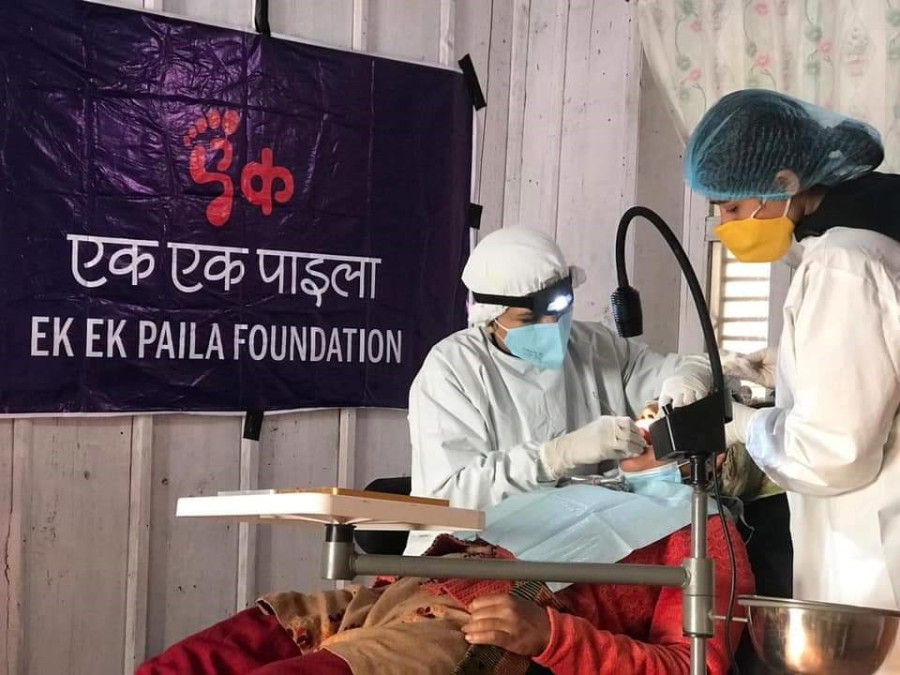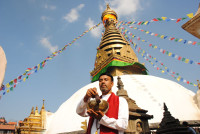Life & Style
Giving back to the community–step at a time
Accessible and affordable health care is a fundamental human right, and Ek Ek Paila is working to make it available to a greater number of Nepalis.
Mimamsha Dhungel
What does it take to make a difference in the world? A team of enthusiastic doctors and health staff created the non-profit organisation, Ek Ek Paila, to answer this very question. Established following the 2015 earthquake to make medical assistance accessible to regions with inadequate medical facilities, the team currently makes quality health services available to people of all backgrounds. Ophthalmologist Dr Suman Shumsher Thapa, the president of this nonprofit organisation, is the driving force behind Ek Ek Paila.
"Many non-profit organisations perform admirable work and have an impact in a variety of fields. Most of the time, however, the person in charge of them grows to be larger than the organisation itself, which is unfortunate. To avoid this, Ek Ek Paila was established as a no-founder foundation, in which everyone involved has equal ownership and understands that the cause inspiring us is bigger than life and more important than our personal incentives," Thapa explains.
Every single donor of Ek Ek Paila is Nepali, according to Thapa. He claims that because of this, there is no outside influence or intervention and it helps the organisation maintain its goals. Initially, Dr. Thapa and his team approached approximately 50 Nepali individual benefactors, private corporate sectors, and other organisations for donations and were overjoyed to receive responses from 70 parties. Ek Ek Paila launched with an initial investment of Rs 20,000,000.
Following registration of the non-profit in 2016, the volunteer doctors went out to remote areas as a part of Ek Ek Paila’s outreach initiative and contributed financially to the noble cause of helping rural communities.
Ek Ek Paila's first outreach program was to the remote areas of Karnali. For three days, a team of volunteer doctors set up a health camp with full health services such as ENT, Pediatrics, Dentistry, and Gynecology among others. The most recent health camp was held in Rukum in December of last year. Ek Ek Paila works with local organisations to improve the effectiveness of the health camp. "A successful health camp requires local support. We collaborate with the local government and non-governmental organisations. We provide free health services, and the team is fed and housed by locals," says Ashok Pandey, the manager at Ek Ek Paila.
In addition, Ek Ek Paila runs a 15-bed hospital in Thokarpa, Sindhupalchok under a joint public and private partnership. According to Dr Thapa, the hospital is situated at the most convenient and well-organised location for people to obtain high-quality health care in Sindhupalchok.
"Ek Ek Paila is for those who have to think twice about getting good health care because they can’t afford it. We regularly assist people from Bagmati squatters and have provided free health care to Pathao riders," Dr Thapa says. The organisation also has an initiative to raise funds for hospital campaigns through music. Dr Thapa is a guitarist and composer of the seven member band, The Blue Fret. They hold a concert every year called ‘Music for Medicine’ to raise funds for the underprivileged.
When asked why he named the organisation Ek Ek Paila, Dr Thapa discloses, "The name Ek Ek Paila came to me at random as we were brainstorming names. Someone noticed that I was wearing a shirt with a footstep image on it and that image has manifested itself in this hospital, where we are taking small steps toward a bigger change." According to Thapa, the organisation has volunteer doctors and even employees who work on a salary basis. But, everyone is committed to the altruistic motto of serving the nation.
“Health care is a basic human right and Ek Ek Paila is working to make this affordable and accessible to a larger number of Nepalis. This rejuvenates our passion to work for the community. One small step we take can indeed be a giant leap in someone else’s life,” concludes Dr Thapa.




 11.53°C Kathmandu
11.53°C Kathmandu










